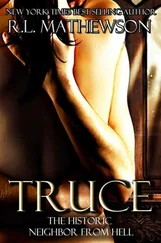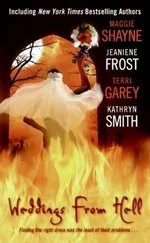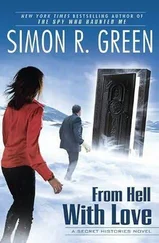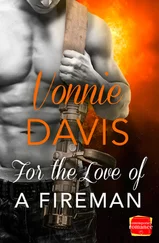“Something like that.”
“So can we sit down at, say, that table over there, or have you got notes back at the office?”
Despite the heat, he was wearing a shabby tweed jacket. He pulled a notebook out of one pocket. “Got most of it here.”
Charles bought Agatha a gin and tonic and himself a whisky and they joined Colin at a table. He flicked through his notebook. “Look at that,” he said. “Perfect shorthand. ‘You need shorthand,’ says the editor. And what happens? Well, these days, everyone’s got a dinky little tape recorder. Still, must admit it’s a good way of keeping a lot of information.”
“So what have you got on Melissa?” asked Agatha eagerly. “Is there a Mr. Sheppard?”
“Easy, now. You paying me for this?”
“Paying your editor,” lied Charles quickly, seeing that Agatha was preparing to give him a lecture. “So you’d better get on with it.”
Colin sighed. “Where are we? Pages and pages of school shooting. Ah, here we are. Background. Married Luke Sheppard in 1992. Divorced a year later, amicably.”
“And did you talk to this Mr. Sheppard?” asked Charles.
“I was about to when the shooting started.”
“Address?”
“Parson’s Terrace, number fourteen, Blockley.”
Charles made a note. “Anything else?”
“When she married Luke Sheppard, she was a Mrs. Dewey.”
“Blimey. Two of them. What of Mr. Dewey?”
“Lives in Worcester. Turnpike Lane, number five.”
“And how long was she married to him?”
“Three years. Let me see, 1988 to 1991.”
“Are there any other husbands?” asked Agatha.
“None that I got around to finding.”
“Got anything else?”
“All the stuff on you, Mrs. Raisin, and your…er…unhappy marriage.”
“You mean, on Melissa?”
“No.”
“My marriage was not unhappy,” said Agatha through gritted teeth.
“Have it your way, but that ain’t what the neighbours say. Raised voices, flying plates, all that stuff.”
“Can we get back to Melissa?” said Charles. Agatha looked about to burst with rage.
“There’s not much to get back to. I say, you pair might at least offer me a drink.”
“First tell us about Melissa,” said Charles.
“There isn’t much more to tell. That’s about as far as I’d got. Got as far as previous husbands and addresses and got called off the story.”
“Come along, Agatha,” said Charles, pulling her to her feet. “Better get going.”
“What about my drink?” demanded the reporter.
“No time,” said Charles, urging Agatha out of the pub.
“You are cheap, Charles,” said Agatha. “I didn’t like the little ferret, but you could have at least bought him a drink.”
“Maybe next time,” said Charles vaguely. “Blockley first. That’s very near Carsely. He could have nipped over there and bashed her, after bashing James first in a fit of jealous rage.”
♦
James Lacey lay in a narrow white bed in the Benedictine monastery of Saint Anselm in the French Pyrenees, drifting in and out of sleep. He had arrived the day before, suffering from heat exhaustion. He knew from his previous visit that it was a closed order. Before, he had been allowed a cold drink of water and a rest in the cloisters before continuing on a walking tour. This time, to his request to join the order, he had been told he was obviously a sick man. He should rest and recover and then they would see.
After leaving Tubby and Harriet, he had slowly made his way south, resting in fields, eating little, always stumbling on, driven by worry and guilt, and fear of the monster he felt was growing in his brain.
He thought briefly of Agatha, but closed his eyes again and willed himself to sleep.
∨ The Love from Hell ∧
4
Blockley, though now a village, was once a thriving mill-town. The mills are now residences, and property prices, sky-high. The village is dominated by a square-towered church, and by Georgian terraces of mellow Cotswold stone. The long straggling main street used to be full of little shops, but only the many-paned shop windows, lovingly preserved, remain to show where they once stood.
It is one of the more picturesque of the Cotswold villages, but, because of an absence of craft shops, thatched cottages, and a museum, is mostly free from the tourists and tour buses which crowd other, more popular, places such as Bourton-on-the Water, Stow-on-the-Wold, and Chipping Campden.
Charles and Agatha drove down into the village from the A-44, “Poor Blockley, it must have the worst roads of anywhere around here,” said Charles.
“Why is that?” asked Agatha idly. She was experiencing a rare peace, because at last she was doing something, and did not want her mood shattered by dwelling on thoughts of James’s infidelity.
“The trucks grind through it on their way to Northwick Business Park,” said Charles. “They chew up the two main roads down into the village and leave big pot-holes, and then all that happens is two men fill the holes up with tarry stones, which soon sink back into pot-holes under the weight of the trucks.”
“I think they need a big-wig of some kind, a member of Parliament, Someone like that, to complain. Where’s Parson’s Terrace?”
“Don’t know. There’s a post office. We’ll ask there.”
As in Carsely, the post office was also the general store. The woman behind the counter told them to turn left as they went out of the shop, left and left again. They would find Parson’s Terrace at the top of the hill.
“We may not find him at home,” said Charles. “May be out at work.”
“We can try. A lot of people work at home in these villages, computer stuff,” said Agatha vaguely.
Parson’s Terrace was a row of very small cottages. “This is it,” said Charles, parking outside.
“I wish we had some sort of official badge we could flash,” mourned Agatha.
“Well, we haven’t. Here goes.”
Charles knocked at the door. “Someone at home anyway,” he said, hearing someone approach.
When the door opened, at first they thought they were facing a teenager. She had black hair pulled back in two bunches and tied with red ribbons and was wearing a short print frock, ankle socks and sandals. Her eyes were large, seeming to fill the whole of her small face.
“We’re hoping to talk to Mr. Sheppard,” said Agatha in that slightly cooing voice in which those who don’t have children and don’t much like them either address the species.
“Luke’s out at work. Can I help you? I’m Megan Sheppard.”
“Ah, what time will your father be home, dear?”
Those eyes widened in amusement. “I am Mrs. Sheppard and you are that Agatha Raisin I read about in the newspapers.”
“May we talk to you for a little?” asked Charles.
“Come in. I was just about to have some coffee. We can have it in the garden. It’s a lovely day.”
They followed her through the dark little cottage – narrow kitchen, poky living-room and out into a pretty garden, where a table and chairs had been set out on a patio. “Have a seat,” said Megan. “I’ll get the coffee.”
When she had gone, Agatha hissed, “How old do you think she is?”
“Late thirties?”
“Can’t be!”
“It’s the bobby socks, Agatha. She’s a lot older than she dresses.”
When Megan came back with a tray of coffee jug and cups, which she set down on the table, Agatha studied her face. In full sunlight, Megan’s face now revealed thin lines around the eyes, but she still seemed remarkably young.
“I did not know Mr. Sheppard had married again,” said Agatha. “There was nothing about it in the papers.”
Читать дальше












